- Home
- John Harris
Getaway
Getaway Read online
Copyright & Information
Getaway
First published in 1956
Copyright: Juliet Harris; House of Stratus 1956-2011
All rights reserved. No part of this publication may be reproduced, stored in a retrieval system, or transmitted, in any form, or by any means (electronic, mechanical, photocopying, recording, or otherwise), without the prior permission of the publisher. Any person who does any unauthorised act in relation to this publication may be liable to criminal prosecution and civil claims for damages.
The right of John Harris to be identified as the author of this work has been asserted.
This edition published in 2011 by House of Stratus, an imprint of
Stratus Books Ltd., Lisandra House, Fore Street, Looe,
Cornwall, PL13 1AD, UK.
Typeset by House of Stratus.
A catalogue record for this book is available from the British Library and the Library of Congress.
EAN ISBN Edition
0755102215 9780755102211 Print
0755127439 9780755127436 Mobi/Kindle
0755127714 9780755127719 Epub
This is a fictional work and all characters are drawn from the author’s imagination.
Any resemblance or similarities to persons either living or dead are entirely coincidental.
www.houseofstratus.com
About the Author
John Harris, wrote under his own name and also the pen names of Mark Hebden and Max Hennessy.
He was born in 1916 and educated at Rotherham Grammar School before becoming a journalist on the staff of the local paper. A short period freelancing preceded World War II, during which he served as a corporal attached to the South African Air Force. Moving to the Sheffield Telegraph after the war, he also became known as an accomplished writer and cartoonist. Other ‘part time’ careers followed.
He started writing novels in 1951 and in 1953 had considerable success when his best-selling The Sea Shall Not Have Them was filmed. He went on to write many more war and modern adventure novels under his own name, and also some authoritative non-fiction, such as Dunkirk. Using the name Max Hennessy, he wrote some very accomplished historical fiction and as Mark Hebden, the ‘Chief Inspector’ Pel novels which feature a quirky Burgundian policeman.
Harris was a sailor, an airman, a journalist, a travel courier, a cartoonist and a history teacher, who also managed to squeeze in over eighty books. A master of war and crime fiction, his enduring novels are versatile and entertaining.
Dedication
FOR MY WIFE
Part One
One
Joe Salomio sat on a box on the deck of his boat, the Tina S, poking at the peeling paint of the cabin hatch with a clasp knife and gazing across the water of Woolloomooloo Bay towards Bradley’s Head and the teeming north side of Sydney Harbour.
“Money,” he said thoughtfully, with an accent in which the Australian was strongly overlaid with his native Genoese, “is a cow. A fair cow.”
Morosely, he eyed the cloud of gulls that mewed and laughed over a patch of floating rubbish, their wings etching patterns in the sky, only half-aware of the cla-clank of cranes behind him and the smell of decaying potatoes that wafted across to him from the warehouses like the bad breath of the city.
“Yeah,” he repeated. “Money is a fair cow.”
His wife looked up at his remark. “Nothing wrong with money,” she said calmly. “It’s not having it that’s no good. Especially when you got to pay a mortgage.”
Joe stood up and flung his arms heavenwards in a gesture that had no roots in Sydney but came untrammelled all the way from the Italy he had left behind him forty years before. “Morgitches! Morgitches! Morgitches!” He spat into the water at his side. “I don’ unnerstand-a morgitches.”
“Don’t alter the fact we’ve got to pay ’em. Robert Rossi’s gettin’ awful troublesome about his money.”
With an air of desperation, Joe lit a scorched fag-end which he unearthed from the thick grey hair round his ear. He rose, hitched up the faded blue trousers which seemed in imminent danger of dropping round his ankles, and sat down again. Pushing to the back of his head the old straw hat he wore, the tear in it mended with sticking plaster cadged from the dockside first-aid man, he stared dispiritedly at the flat-sided cubes of the business quarter beyond the ’Loo, then he stuck his knife into the planking and stood up once more, restless, his fists in his pockets, the greasy patches on either side of his behind, where he always wiped his hands after a job or before a meal, gazing backwards like two smudged dark eyes.
His wife watched him with a cautious affection on her face that was tempered by the faint, contemptuous knowledge that so long as he was within reach of the shore he was always restless and in danger of disappearing. His predilection for the bars along the waterfront had left its mark in the potbelly that marred his short square frame. Where he had once been broad-backed and strong, he was now as round as a toby jug and beginning to stoop with age.
She studied his deeply lined features calmly, and the shock of crisp hair that had thinned to a tonsure round his head, then she put down the last of the potatoes she was peeling and walked heavily across the deck to throw the dirty water overboard, in a deliberate effort-saving movement that indicated she had performed it hundreds of times before, shuffling in the bedroom slippers she wore to ease her bunions. She swept her greying hair back and returned to her seat, Joe following her every inch of the way with his eyes.
“How long-a we got, Rosa?” he asked.
“End of the week,” his wife said slowly.
“What happen then?” Joe was slumped against the cabin top, his shoulders hunched up round his eyes, his whole frame listless.
Rosa turned on him. “You got any ideas?” she asked.
Joe gave an embarrassed shuffle on his box.
“I thought you hadn’t.” Rosa provided her own answer.
Joe stared sadly at her, reflecting bitterly that the habit of speaking respectfully to him had long since died out in his family. No one ever indulged in it – not Rosa, nor Francesca, his youngest child, nor Florentina, his eldest. Even his son, dead these fourteen years, hadn’t had much respect for him.
“You sit on your behind,” Rosa was saying, “happy as Larry, asking what we’re going to do next, and that’s all. If you’d saved some of the money you’ve wasted, we might still have the boat next week.”
“These-a city bums,” Joe said weightily, trying to direct his wife’s anger from himself to the cause of their worry. “They too smart for a coupla old Italians like us.”
He watched his wife slap-slap to the cabin hatch and ease her bulk below-deck, then he sat staring heavily in front of him, conscious of the perspiration that stood out on his face. He fanned the hot air about him with his hand, feeling a spasm of relief and pleasure as his senses told him a southerly buster was due, gathering itself among the waves of the Tasman, whirling itself into a ball, ready with its cool breath to burst out of the horizon over the sweltering city, rattling up the harbour and whistling through the bridge, stirring the wave-tops to white and flinging the birds in ragged flocks from among the chimneys.
Sydney waited for it in a breathless stillness, the sun glaring from the golden bowl of the sky, stretching the shadows like sooty squares across the streets and up the sides of the buildings opposite; while the smoke stood straight up into the air, in wavering lines, all the way along the water’s edge from Watson’s Bay and Vaucluse to Darling Harbour and the old Pyrmont Bridge.
Down in the ’Loo, the tall buildings that rose beyond the wharfside in towering sierras, range upon range of them, reflected the heat in shimmering waves, and that part of the wharf where the Tina S lay, being the oldest and most disreputable, was the hottest of a
ll.
To one side of the little boat were other craft, motor fishing vessels most of them, squat ships with hut-like wheelhouses and single masts; and on the other, soiled by the gulls and the dockside sparrows, the water-logged dinghies, the weather-blackened dumb barges with their weed-festooned ropes, and the worn-out tugs with their old tyres and burst fenders, all the junk of the harbour; so that the Tina S seemed to be the point where the living became the dead.
Joe stared irritatedly at the coils of old rope on the wharfside and the heaps of stacked coal where a knife-backed cat moved, its yellow eyes steady on the sparrows that twittered and hopped among the debris of the dock like so many puff-balls of wool, its fur electric with its tension. He was well aware of the Tina’s incongruity among the trawlers that surrounded her, well aware of her drabness against their bright colours and italienate flourishes of the paint brush.
Sentimentally called after his first-born, a dark-haired Italian flower of a child who had long since broadened into the parent of five strapping boys fathered by a Brisbane greengrocer, the Tina was shaped like Joe, more for strength than speed. Her untidy decks were of solid teak and though she had the tall mast and booms of a fore-and-aft rig, she had not worn her patched canvas since the Blessing of the Fishing Fleet the previous year when Joe had been too broke to buy fuel for her ancient engine and his wife had been too steadfast in her religion to let him miss the occasion. With her old tyres and peeling paint, she sprawled like a fat old charlady, blowzy with lack of care, against the green weeds and orange fungoid growths that speckled the piles of the wharf.
Joe threw away his cigarette end angrily and climbed down to the cabin where Rosa was clustering pans round an enamel coffee pot that was spotted with chips like a leopard. About her, pinned to the bulkhead, a splash of colour behind her dark hair, were the familiar brightly coloured pictures of scenes from the Bible – the Last Supper, the Parable of the Loaves and Fishes, the Foolish Virgins.
Joe sighed noisily and from the spare bunk his youngest daughter, Francesca, looked up from the film magazine she was devouring, her knees hunched under her chin, her untidy dark hair hanging round her eyes.
“Howsit, Pop?” she said casually.
“How long you been back, Frankie?” Joe demanded.
“Ten minutes.” She brushed her hair aside and grinned. “You were right. The storeman said ‘nuts’. No money, no paint. He said you were an old bum.”
She turned to the magazine again, and, wriggling further down on the bunk, promptly forgot him.
Her father studied his daughter’s heart-shaped face affectionately. She was a slender underdeveloped child who had arrived long after Joe and Rosa had ceased to expect children. Her great dark eyes were forever smudged to shadows by long black lashes that unmanned Joe a dozen times a day as he looked at them, making him form promises about working for her and giving her a good education which he never remembered for more than a few minutes. As he watched her, she sniffed at the smell of food and, putting the magazine down again, pushed her slender body from the bunk and stood up, clad in dirty jeans and a T-shirt.
Joe stared round the cabin for a while as he sat down, then he lifted his eyes again to look at his wife.
“Mama,” he said. “What-a we going to do?”
Rosa thrust a chubby hand into the fold of her dress and with it lifted the coffee pot to the table and banged it down with an air of determination. Frankie promptly banged down a tin mug alongside, and, pouring coffee into it, took it back to the bunk and retired once more behind the magazine.
Rosa was staring thoughtfully at the table. “If they think they’re going to get the Tina they’re mistaken,” she observed and there was something in her tones which made you feel she might be right in what she said. She was a big woman, olive-skinned and sloe-eyed like her husband, but confident with a certainty of authority that Joe had never possessed. For all her Italian features, her accent was all Australian, for she had been born in the ebullient city of Sydney among the southside fisherfolk and only in her emotions and her features was there any trace of her ancestry.
Joe shuffled on his box against the iron bed that was jammed into the end of the cabin, ugly but curiously enough not incongruous on the old boat which often wore Joe’s vests and Rosa’s drawers for bunting. They had had to remove two bunks and the cabin top to get it in but Rosa had insisted on its comfort when they had first decided to live aboard to save money.
Joe sighed again, rubbing the palms of his hands along his thick thighs uneasily. “So,” he said, shrugging in a graphic gesture of despair. “Here we go again. You say-a that for weeks. Mama, we don’ get nowhere.”
Rosa turned on him. “This ship belongs to us,” she said stoutly. “It would have belonged to Georgie by this time – only – only–” she halted, her eyes on the gaudy, coloured photograph of a young man in sailor’s uniform that was screwed to the bulkhead, and as she became silent her calm face was brushed with the uneasy memory of pain.
Frankie looked up quickly over the magazine, her eyes anxious. “Steady on, Mama, don’t go over that again,” she said.
“The war’s over and done now,” Joe put in. “We don’ got Georgie no more.”
Rosa straightened up, thrusting the past behind her so that her heavy face was smooth again, and Frankie returned satisfied to her magazine, absorbed in the glowing activities of the stars.
“All right,” Rosa said, shrugging away Joe’s hand. “I’ve finished now. Well, like I said, she would have been Georgie’s if he’d come back. Well, he didn’t, so its going to belong to Georgie’s son as soon as he’s grown up. Florentina’s OK. Her children don’t need no boat. They got the shop.”
“What about me, Mama?” Frankie put down her magazine again. “Don’t I get a look-in?”
“You’ll get married and change your name like Florentina. Then you’ll be some other family’s responsibility.”
Frankie snorted. “Nuts! Nobody need be responsible for me. I can look after meself.”
“Maybe you can,” Rosa agreed. “But Tommy’s different. He’s got nothing. Not even a father. He’ll be old enough to leave school soon.”
Joe snorted and shrugged hugely. “The strength is more important than the brains in fishing. Giuseppe Salomio don’t need no schooling to get around.”
Rosa listened to him with indifference as she had been doing for years, hardly hearing. “Yes, you get around,” she said, “from bar to bar, from bottle to bottle.”
Joe looked sulky. “Well, why don’t Tommy come and take over now, Mama? He’s growing. Why don’t he leave school already? Frankie’s left school. She’s got a good job.”
Frankie gave a sarcastic grunt from behind the magazine.
“Georgie married a girl with more sense than we had,” Rosa said. “Lucia’s getting Tommy to learn a few things first and when he’s learned ’em, he’ll be a better business man for it. He’ll be buying up other boats before he’s thirty, like Angelo Carpaccio does.”
“He’ll finish up by being a clerk at the fish-manure factory or something, he’ll be so clever,” Frankie said. “Especially if we ain’t got the Tina no more.”
Rosa rounded on her. “No, he won’t. Fishin’s in his blood and they won’t take the Tina off us. We’ll hide her first.”
“Hide her?” Frankie flung the magazine aside and sat up sharply, her long thin legs hanging over the side of the bunk.
“Yes.” Rosa had not really meant anything in particular when she had suggested defiance but now, as an idea occurred to her, her face lightened suddenly. “Yes, that’s it. We’ll hide her!”
“Where’ll we hide her? Under a tree in the Botanical Gardens?”
“No.” Rosa’s face lit up with enthusiasm as her idea grew in her mind and she chuckled. “No. There’s a better place to hide her than that.”
“Tell me, Mama!” Joe affected a studied patience that indicated his very impatience. He hung his hands by his side, his head tilted, a monume
nt of attentiveness. “See,” he said. “I wait.”
“Joe!” Rosa’s face was glowing now. “There’s islands. Dozens of ’em. Hundreds of ’em. Thousands of ’em.”
“Millions of ’em, Mama, you like it that way. Go on.”
“Straight off this coast. Straight out. You can go on for ever. Right out into the Pacific.”
What she was getting at began at last to penetrate Joe’s slower brain and he jumped off his soap box, his dark eyes bulging, his jaw dropped open.
“The islands, Joe,” Rosa went on. “The islands in the Pacific! We can hide her for months among the islands. We can hide her for years if necessary. Other boats go from here to the islands.”
Frankie jumped down from the bunk and stared at her mother, her hands flat on the table, her dark eyes bright in her gamin face, her harum-scarum soul uplifted by the prospect of adventure. “Dinkum, Mama? You mean that?”
Joe was silent, busy with a momentary mental picture of the Tina S trudging away from a Pacific blow like a stout old lady running in vain to catch a moving bus. His voice dropped as he answered and his tones became a theatrical whisper.
“Mama, those-a boats are big ships, not little pudding-a-basins like the Tina.”
Frankie whirled to face him. “Come on, Pop,” she begged. “Don’t go all jelled-up on us.”
Rosa wasn’t looking at them. Her dark eyes were staring unseeingly in front of her, blissfully oblivious of her husband’s sarcasm, his agitation, everything except the magnificent glow her idea threw across her brain.
“Big ships. Little ships,” she said. “That don’t matter. If they can go, so can we.”
Joe stamped his foot dramatically and pointed to the deck. “Mama, not this old barrel! She don’t get built for these waters. She sink.” He whirled his hand and executed a flourishing spiral to indicate the Tina disappearing to the bottom of the sea.

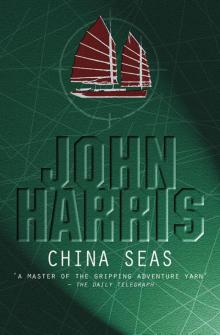 China Seas
China Seas The Mercenaries
The Mercenaries Road To The Coast
Road To The Coast The Thirty Days War
The Thirty Days War The Old Trade of Killing
The Old Trade of Killing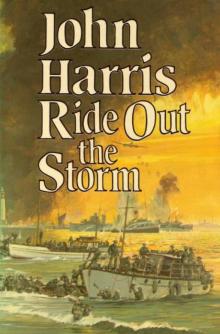 Ride Out The Storm
Ride Out The Storm Corporal Cotton's Little War
Corporal Cotton's Little War Fox from His Lair
Fox from His Lair Paint The Rainbow
Paint The Rainbow Flawed Banner
Flawed Banner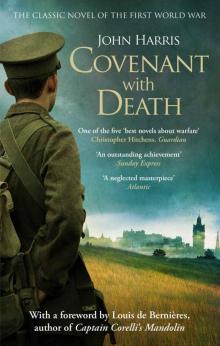 Covenant with Death
Covenant with Death So Far From God
So Far From God The Sea Shall Not Have Them
The Sea Shall Not Have Them The Cross of Lazzaro
The Cross of Lazzaro Smiling Willie and the Tiger
Smiling Willie and the Tiger Harkaway's Sixth Column
Harkaway's Sixth Column The Sleeping Mountain
The Sleeping Mountain The Claws of Mercy
The Claws of Mercy North Strike
North Strike Picture of Defeat
Picture of Defeat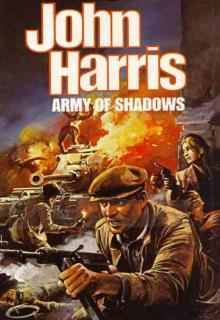 Army of Shadows
Army of Shadows Right of Reply
Right of Reply Getaway
Getaway The Lonely Voyage
The Lonely Voyage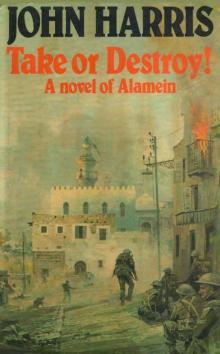 Take or Destroy!
Take or Destroy!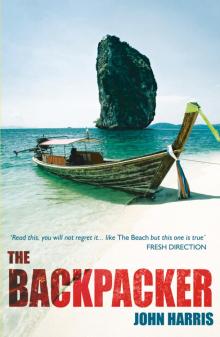 The Backpacker
The Backpacker A Funny Place to Hold a War
A Funny Place to Hold a War Swordpoint (2011)
Swordpoint (2011) A Kind of Courage
A Kind of Courage